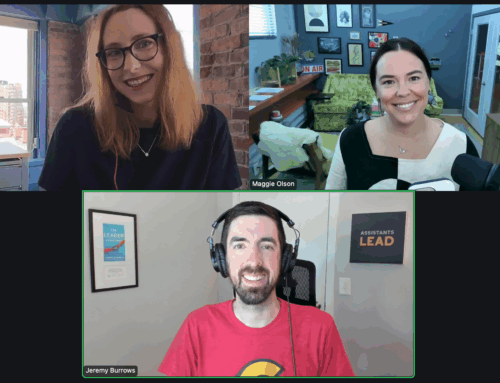Should we be scared our jobs are going to be replaced by AI?
Yes, and no.
If we don’t have a healthy fear (i.e. – reverence and respect) of AI and other technology as more and more tasks are handled by machine learning algorithms and automated software, we may not survive the wave.
We’re a long way from being fully replaced by robots, in my opinion. But AI is infiltrating more and more industries and rapidly changing the way we work.

Source: Unsplash
Take me, for example. I’m an Executive Assistant at an artificial intelligence software company (Capacity).
At Capacity, we’ve built an AI-native support automation platform that helps teams that are overwhelmed with tickets, emails, and repetitive tasks by automating support and business processes via a simple interface (check out our website if you want to learn more about our software).
Capacity is already handling tasks that myself and other team members would typically be responsible for.
For example:
- If a co-worker wants to know when my executive (our CEO) is free next, they can just ask the Capacity bot.
- If my executive needs someone to remind him to head to his next meeting, Capacity can do that.
- If I can’t find the Product Roadmap document in my cloud drive, Capacity can.
- If a team member heading home late can’t remember the alarm code as it’s going off at 10:17pm, they can ask the Capacity bot.
- What if I’m planning family vacations with my wife and she wants to know what holidays we have off? You guessed it, I can ask the Capacity bot.
As I watch the AI revolution unfold at the desk across from me (literally), it’s difficult to ignore what’s coming.
But there is good news. AI will never replace humans.
In fact, many believe AI + Humans is the future of work, not AI vs Humans.
The above list of tasks Capacity can help with is not full of tasks that typically bring people joy and excitement.
Imagine if your team members could spend time solving real problems and creating amazing products – not answering the same questions over and over.
So don’t let the fear of being replaced by an AI assistant paralyze you.
Instead, ready yourself for the already-begun AI revolution.
Here are a few ways you can prepare yourself for the future of work.
1. Be an Early Adopter
The first way to future-proof is to learn about and use new technology as it becomes available – or even better – before it’s available to the rest of the world.
Be an early adopter!
I believe every employee will have one or more AI assistants working for them in the near future (if not already).
Get your hands on the latest technology that could help you with any aspect of your job.
How? Sign up for free trials, join beta tests, or apply to be a guinea pig for your friend’s new project.
Maybe it’s an AI platform that can schedule meetings, mine policy documents, and answer FAQs (Capacity).
Or maybe it’s an automation tool that can help you quickly audit your executive’s time, so you can be more strategic with their schedule (Zapier).
Whatever it is, be on the hunt for opportunities to use the tools that will shape the future.
Another bonus to being an early adopter is you can provide valuable feedback to the developers and creators so the tools can become more user-friendly and practical for everyone.
When you come across opportunities to beta test something, be sure to share the opportunity with others. Hoarding will not expedite the product’s go-to-market timeline.
Learn to work with AI.
Educate Yourself
If you aren’t sure where to look for opportunities to be an early adopter, start by educating yourself.
Take an AI course. Listen to a machine learning podcast. Read books and articles on the future of work.
To help you kick-off your AI learning, I put together a list of helpful AI resources here -> Download my FREE AI Resources Guide
2. Develop Your Emotional Intelligence
You may be up to speed on all the latest and greatest software, hip to modern business tactics, and crushing it with your leadership skills, but how emotionally smart are you?
Emotional Intelligence is the “capacity to be aware of, control, and express one’s emotions, and to handle interpersonal relationships judiciously and empathetically.” (Source)
Keeping human-only skills sharp is another key to future-proofing your career.
Robots will never know what it’s like to be human.
They will never be able to feel your pain, experience your joy, or know how badly you miss a loved one.
They will never be as intuitive as an emotionally aware human being.
So how do we cultivate our emotional intelligence?
This Forbes article suggests we can develop our EQ in the following ways:
- Manage our negative emotions
- Be mindful of our vocabulary
- Practice empathy
- Know our stressors
- Bounce back from adversity
This helpful post from Inc.com has a few more tips for increasing emotional intelligence:
- Utilize an assertive style of communicating
- Respond instead of reacting to conflict
- Utilize active listening skills
- Be motivated
- Practice self-awareness
- Be approachable and sociable
I’d also encourage you to check out these books on Emotional Intelligence:
- EQ Applied: The Real-World Guide to Emotional Intelligence
- Emotional Intelligence: Why It Can Matter More Than IQ
In short, focus your time and energy on being more human.
3. Look for Problems + Suggest Solutions
Next, you can prepare for the future by solving problems others have yet to solve.
You could sit on your hands, complain about what’s wrong, and let other people figure out solutions. But I’m betting you clicked on this article because you don’t want to end up being replaced by an AI assistant someday.
Executive Assistants see almost everything, so they are often in the best position to solve problems in their company.
Even if you’re not an EA, if you’re a self-motivated problem solver who constantly brings solutions to the table, you will not be replaced by AI someday.
Sure, your solutions may not always be the best answer to a given problem. But failing over and over is often the only way to solve problems.
You might as well help the team fail quicker, right?
Be a problem solver.
4. Be a Generous Networker
When I was dating, my good friend shared an unwritten rule I had never heard before.
He said, “You can’t kiss her until you find out her middle name.”
Now, I don’t know if that rule is applicable in today’s dating scene – I’ve been happily married for a while now – but in a way, it applies to the networking scene.
No one likes the networker who tries to sell you something, or asks you for a favor as soon as they find out your name. They could at least buy you a drink first!
As you’re networking with people – in person or online – keep this question on the top of your mind:
“How can I truly help this person in this moment?”
Helping could simply mean you listen to them rant about their day.
It could mean suggesting a software tool you use that solves the exact problem they’re wrestling with.
It could be introducing them to a friend in their industry.
It could be sharing their blog post with your LinkedIn network.
Notice how none of the above examples involve you getting something out of them.
Help others, but don’t keep score.
Don’t help someone with the expectation that they will owe you something in return.
If you help people without keeping score, you’ll master the art of networking.
If you master the art of networking, you’ll be infinitely more valuable to your company than an AI with zero LinkedIn connections.
5. Be Kind to People
This should go without saying, but unfortunately I must say it.
Be kind to people.
You can master everything else in this article, but if you’re a jerk, good luck out-lasting a robot who does what it’s told – without the attitude.
When the recession hits and companies look to trim their head count, you better believe they’re going to try their darnedest to keep the employees who are pleasant to be around.
An AI won’t ask how your elderly father is holding up after his hip replacement.
An AI won’t be sensitive to the fact that you were crying in the break room because your cat died.
An AI can’t offer you a ride when your car breaks down (ok, maybe in some places it can, but you get the idea).
Treat humans like they’re people who matter, because they are.
To recap, here are 5 ways to future-proof your career:
- Be an Early Adopter
- Develop Your Emotional Intelligence
- Look for Problems + Suggest Solutions
- Be a Generous Networker
- Be Kind to People
I hope you’re challenged and encouraged as you consider how to prepare for the AI revolution that’s already begun.
P.S. – Don’t sit on your hands or ignore what you just read. Take action now and grab the FREE AI Resources Guide here.



